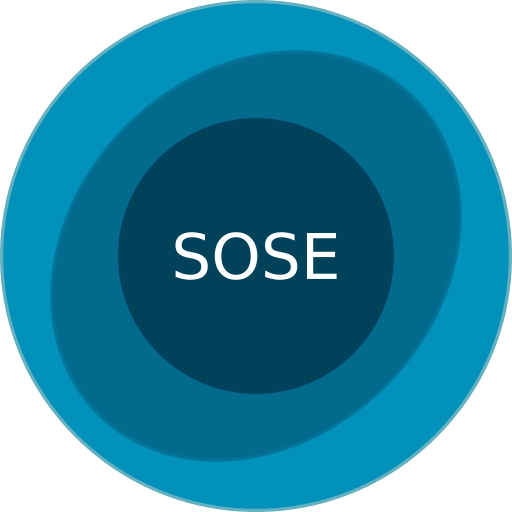Registration information
Registration to SoSE 2023 is through the EDAS system, https://edas.info, used for managing the conference. If you do not already have an account, you must first create one.
Important: We strongly advice that you pay by credit card, rather than wire transfer, since wire transfers tend to be extremely slow and error prone
Paper submission must comply with IEEE standard guidelines. Microsoft Word or LaTeX IEEE Conference templates are available here:
Full papers should be submitted in standard IEEE double-column format for conferences. The first page of the paper, centred on the top below the top margin, should include the paper title, the authors’ names and their affiliations, an abstract, and keywords. Five to Six pages are allowed for each paper. Submitted papers will undergo a peer review process, coordinated by the Program Chairs and the IPC. During the revision phase, we are allowing papers up to 8 pages in length to be submitted for review. However, we would like to inform you that any additional pages beyond the 8-page limit will incur an additional fee during the final submission and acceptance process.
Conference Registration Fees
Special Session information
Robust and distributed control in a cooperating system of systems
Alessandro Bozzi, University of Genoa (Genoa, Italy)
Simone Graffione, University of Genoa (Genoa, Italy)
Jose-Fernando Jimenez, Université Savoie Mont Blanc (Annecy, France)
Camilo Hernandez-Rodriguez, Université Savoie Mont Blanc (Annecy, France)
In system of systems engineering, the control approach plays a key role in guaranteeing the desired performance. During the last few years, many new ways to face the control of multiple systems at a time have been analyzed, with robust controllers widely used to minimize the deviation from the desired behavior due to noise and perturbation that may affect the system, and distributed approaches to enhance the cooperation between each entity increasing the knowledge of the environment. While ad-hoc techniques are used to boost performances in specific applications, one of the most wanted characteristics in SoS controller design is its adaptability to other fields. Moreover, cooperating SoS remains partially undiscovered, mainly due to the novelty of the topic, and in this direction, the proposed special session aims at pointing out the principal improvements in the control and monitoring of such complex systems. For all these reasons a Special Session regarding the robust and distributed control in cooperating SoS seems to be the best option in order to sum up the state of the art of the newest control techniques to various scenarios, with particular attention to the interoperability of the approach to different fields of application. Specific topics of interest for the special session include, amongst others:
- Autonomous vehicles
- Mobile robotics
- Greenhouse management
- Industrial processes
- Monitoring of smart manufacturing systems
- Control of perturbed systems
- Cooperative space exploration
- Etc.
System of systems engineering approaches to Reliability, Availability, Maintainability, Safety and Security
Mohamed Sallak , Université de Technologie de Compiègne (Compiègne, France)
Enrico Zero, UNIGE (Genova, Italy)
Roberto Sacile, UNIGE (Genova, Italy)
In engineering approaches, a system can be designed as interconnected subsystems, known as System of Systems (SoS). In SoS, the relevant aspect to be investigated is the presence of an emergent behavior, which may occur as a risk for the overall integrity and reliability of the whole system. This concept is usually in relationship with reliability availability maintainability safety security (RAMSS) requirements. The RAMSS analysis deals with the functionality of the subsystems to avoid possible failures during the system operativity decreasing the probability of failures that may generate losses in performances. This aspect nowadays becomes very important in the industrial context due to recurrent maintenance costs such as corrective/predictive repair/replacement costs and inspection costs. The concept of risk in maintenance is usually ignored in the predictive maintenance model cost optimization context. The proposed Special Session aims to propose the current state of the art related to the technology used for safety in system of systems, focusing on the most innovative approaches in term of challenges, requirements, methodologies, technologies, and smart applications.
Theoretical Foundations of System of Systems Engineering (THEFOSE)
Omar Hammami, ENSTA School (Paris, France)
Thomas Rigaut, CS Group (Paris, France)
System engineering has experienced multiple successes over the years in various industrial projects with a strong emphasis in defense and aerospace. Recently, system engineering have gained several contributions from theory however the field still lacks a strong theoretical foundation. This request for more theoretical foundations come from both academia and industry in order to make the best of system engineering practices and experience in increasingly multidisciplinary projects. Several research topics need to be addressed such as formal definitions of system of systems engineering terms and concepts, systems of systems semantics, complexity theory of multidisciplinary system of systems, formal analysis of system of systems engineering processes and standards but also all theoretical computer science impacts on languages (e.g. SysML) and tools used by system of systems engineers. This session contributors will also provide papers discussing the integration of quantitative methods into MBSE methods and processes. Examples of quantitative methods include formal methods, value driven design, petri-nets, multidisciplinary design and analysis optimization (MDAO) for System of Systems , etc. This session will as well explore architecture frameworks and their theoretical foundations and complexity. Finally, the session will also call for papers proposing new research directions and tutorial papers in the theoretical foundations of system of systems.
